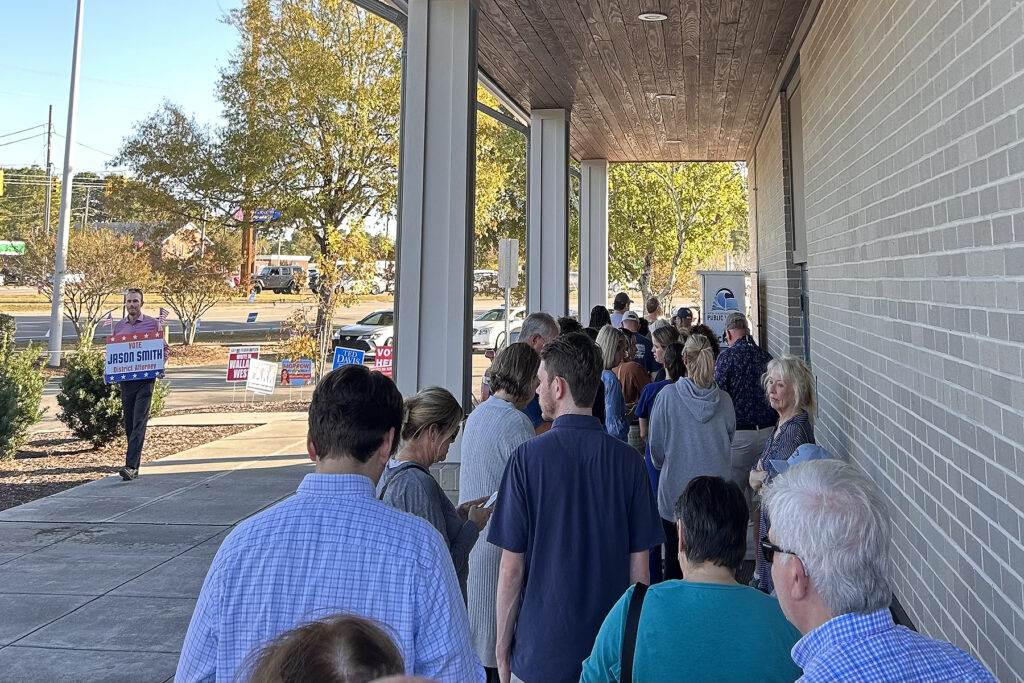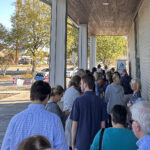In just over 48 hours in early October, the University of North Carolina at Wilmington Young Democrats put together a canvassing event to register new voters. It was just days ahead of the Oct. 11 voter registration deadline, and there was an urgency to their actions.
As in other swing states, voters in North Carolina could decide the presidential race. Democratic candidate and Vice President Kamala Harris and Republican candidate and former President Donald Trump were in a dead heat at the time of publication, and, barring something unforeseen, that is not likely to change.
North Carolina voters seem to know what it is at stake.The North Carolina Board of Elections reported that the state set a first-day early voting record of 353,166 ballots on Oct. 17.
“When we’re out canvassing, it’s nice when we get people engaged in conversation. It’s inspiring,” said UNCW Democrats member Samantha Bryan. “There’s definitely a good amount of apathy on campus, but it’s not disheartening because we get an equal amount of support.”

In North Carolina, Trump won the state in both 2016 and 2020, although the margin of victory was slim.
Often called a “purple” state, candidates deliberately work to swing North Carolina and bring its 16 electoral votes to their side.
“North Carolina is very much a battleground state,” said Aaron King, professor of political Science at UNCW. “It is unique in that sense because there are only a handful of them. That’s why we get extra candidate visits, and all the ads that we get. Being in a battleground state, particularly a battleground region of a battleground state, it is quite competitive here, particularly once you throw in the surrounding areas.”
That’s why getting young people to vote is key for many canvassers. In 2022 youth voter turnout ranged from 37 percent to 13 percent across the country, according to the Tufts Center for Information and Research on Civic Learning and Engagement, or Circle. North Carolina fell in the middle with 23.1 percent, a 6.9 percent increase from the state’s youth voter turnout in 2014.
Ella Cacali, a volunteer for UNCW Young Democrats, said students frequently tell volunteers how relieved they are to have found them so they can register to vote.
“It’s nice when those people are seeking you out and take action to register and you can actually help them out with that,” Cacali said. “It’s a good feeling to have.”
While there is a buzz in the air surrounding this election season, not all students feel excitement when seeing the canvassers and election signs on campus.
“There is definitely something to be said about over-saturating the environment,” said unaffiliated first-time voter Braeden Potter-Gendle.“If every 30 seconds I’m watching an ad telling me to vote for somebody this or somebody that, it sort of makes me not want to vote for anybody at all.”
Potter-Gendle said he will ultimately vote out of civic duty. But he won’t engage with the canvassers.
“I don’t necessarily trust that someone who is trying to canvas for the Democratic party or canvas for the Republican party is actually going to give me an accurate depiction of the way things are,” Potter-Gendle said.
Potter-Gendle isn’t alone in this. In 2020, 33% of Gen Z voters were registered as unaffiliated, with 26 percent being registered Democrats and seven percent being registered Republicans. According to Pew Research, younger voters are also more likely than older voters to be partisan “leaners,” meaning they feel more comfortable extending beyond party lines when casting their vote.
Among young people, new voters are taking interest in issues versus candidates.
“It becomes more personal, such as women’s rights and abortion rights, things to do with immigration in the country or student loans,” said Mack Gregory, a local canvasser with You Can Vote. “All of that is very personal to students, so I definitely think it’s more issue driven.”
Gregory said the students he talks to want to know more so they can make an informed choice.
“There is a clear drive that they want to be more politically active especially with how tense this election is,” Gregory said. “Despite how tense it currently is, it is very sweet that so many students are willing to learn more about each other. They aren’t going to immediately shut down.”
But while many young people have personal political opinions, not all feel spurred to vote to support them.
Davis Bell, a UNCW senior who has consistently voted since he turned 18, said he thinks he knows why.
“The reason young people think the government doesn’t care about them is because they don’t care about the government,” Bell said. “It’s going to take a new generation of politicians because 99% of the people on this campus couldn’t tell you the names of the politicians that affect their lives,” Bell said. “Hell, I couldn’t. I’m guilty of that as well.”
King, the professor, said politicians would do well to engage more with young voters, even if young voters are not what candidates think are “the biggest return on their investment.”
“Every new generation of voters is a brand-new opportunity for candidates,” King said. “Young people need to take that advantage and present themselves as a formidable voting block to then tell political consultants and candidates, ‘Hey, you need to pay attention to this.’”
Emmy Berger is a freelance writer who attends the University of North Carolina Wilmington.
- Erasing history: Federal judge likens Trump’s order to remove slavery exhibit near Liberty Bell to Orwell’s 1984
- ‘Sorry, AP Chem’: How student media at one Missouri high school covered a walkout to protest ICE
- News analysis: Missourians take leading roles in Trump’s ‘weaponization’ of the Justice Department and election denial
- Commentary: Stars and Stripes’ legacy of editorial independence shows value of a free press
- News analysis: Trump’s handling of Minnesota investigations defies time-tested procedures and looks like a ‘cover-up in plain sight’
